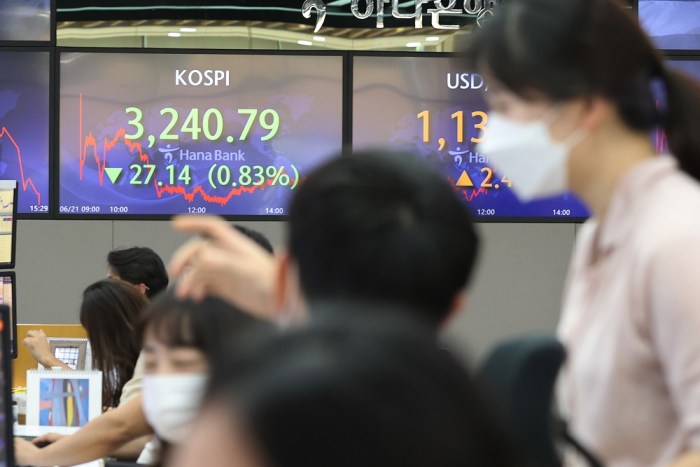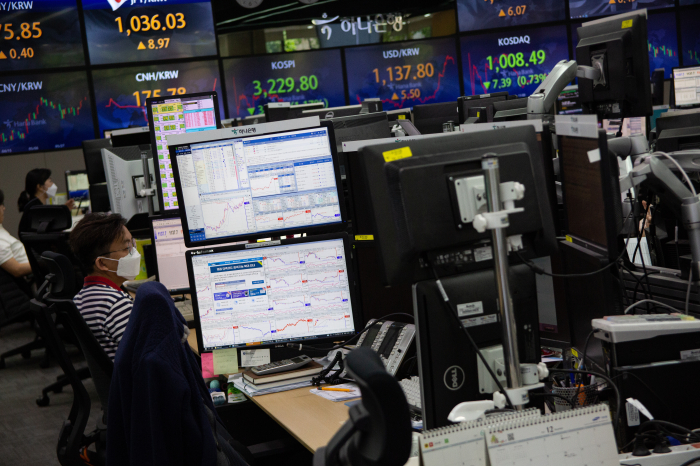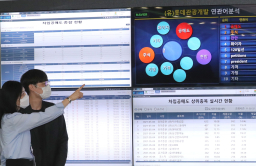-
KOSPI 2577.27 -2.21 -0.09%
-
KOSDAQ 722.52 -7.07 -0.97%
-
KOSPI200 341.49 +0.02 +0.01%
-
USD/KRW 1396 -2.00 0.14%
Short-selling ban keeps Korea from MSCI’s developed-markets index
Markets
Short-selling ban keeps Korea from MSCI’s developed-markets index
Foreigners may move money elsewhere if Korea remains an emerging market, analysts say
By
Jun 22, 2021 (Gmt+09:00)
3
Min read
News+

South Korea is unlikely to obtain the global index provider MSCI’s developed-market status this year with the Korean government’s decision to maintain a short-selling ban on smaller stocks a key hurdle for inclusion.
According to the recently released MSCI 2021 global market accessibility review, the index provider refused to place the Korean equities market on its watchlist for potential reclassification as a developed market, maintaining its emerging market status since 1992.
MSCI Inc. will officially announce the results of its assessment of global markets for reclassification on June 24, but the outlook for Korea to make the watchlist is dim, industry officials said.
Since Korea was first categorized as an emerging market in 1992 by MSCI, or Morgan Stanley Capital International, known for its benchmark indexes, MSCI has mentioned the country’s poor market accessibility, largely due to the lack of an offshore currency market, as the most significant reason for its refusal to grant developed market status to the country.
Korea was placed on the watchlist as a developed-market candidate in 2009 but dropped from the list in 2014 largely due to the government’s reluctance to accept MSCI’s request to open an offshore currency market.
In its latest accessibility review, MSCI singled out Korea’s stance on short-selling as an area of “deterioration” in its assessment.
Following a 14-month ban as a COVID-19-related measure, Korea’s financial regulator in May partially lifted the restriction for large stocks included in the benchmark Kospi 200 and the junior Kosdaq 150 Indexes amid opposition from retail investors, who had then called for a complete ban for good.
SHORT-SELLING BAN NOT IN LINE WITH GLOBAL STANDARDS
The decision came after criticism from foreign and institutional investors that such a ban, the longest among major economies, was hurting investor sentiment and unaligned with global standards.
“There is no timeline on the potential resumption of short selling for the remaining securities in the Korean equity market,” MSCI said in the latest review.
“As such, Korea will experience a deterioration in the rating for short selling given that current limitations remain in place for a number of securities.”
Market accessibility is one of the key criteria alongside economic development, market size and the level of liquidity for MSCI to categorize a country as a developed, emerging or frontier market.
In the accessibility review, the global index provider reiterated the existing four conditions deemed negative for Korea's upgrade: equal rights to foreign investors; foreign exchange market liberalization level; investor registration and account set-up; and information flow.
“Information disclosure in English has improved but is not always readily available for all companies. In addition, Korean companies disclose dividend amounts after the ex-date of the dividends, which is different from international standards. Also, estimated dividends are generally not provided,” MSCI said.
Regarding the liberalization of the foreign exchange market, MSCI said, “there is no offshore currency market.” The Korean government has balked at the idea, saying such a market would increase local currency volatility given that Korea is a small open economy heavily dependent on exports.
MSCI also noted that foreign investor registration is “mandatory and requires a significant amount of supporting paperwork.”
KOREA DISCOUNT
Lee Byung-tae, a business professor at Korea Advanced Institute of Science and Technology (KAIST), urged the government to act more aggressively to have Korea included in the MSCI developed-market index, saying it’s one of the best ways to solve the “Korea discount” problem and enhance the corporate value of listed firms.
Samsung Securities analyst Kim Dong-young said Korea’s inclusion in the index is long overdue.

“If Korea continues to remain in the emerging market category at a time when passive funds tracking key indexes such as MSCI are on a steady increase, foreigners will be tempted to move money to more promising markets, including China,” Kim said.
Other global stock market index providers, such as Dow Jones, S&P and FTSE, have classified the Korean equity market as a developed one.
Write to Yun-Sang Ko and Eui-Myung Park at kys@hankyung.com
In-Soo Nam edited this article.
More To Read
-
 Korean stock marketOnce resistant, Korean retail investors lend more stocks for short selling
Korean stock marketOnce resistant, Korean retail investors lend more stocks for short sellingJun 21, 2021 (Gmt+09:00)


